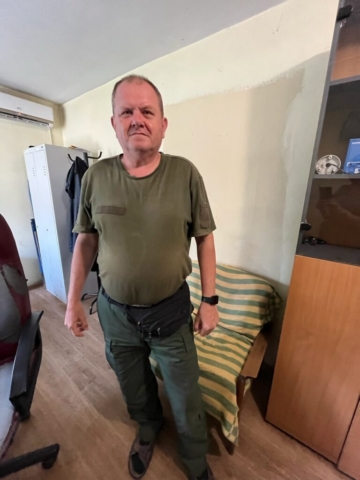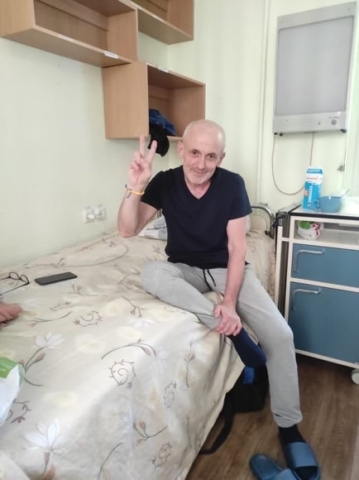Valerij Sokolov is a former miner from Donetsk. After the Russian occupation of the city, he stayed behind to care for his elderly and sick parents and parents-in-law. Unwilling to hide his pro-Ukrainian views, he took part in several protests against the Russian attack and occupation. In November 2015, he was arrested by the secret services of the so-called Donetsk People’s Republic and taken to the Izolyazia concentration camp. There he was regularly beaten with cruelty.
Sokolov was falsely accused of attempting to murder Motorola, one of the leaders of the so-called Donetsk People’s Republic. During the torture, most of his teeth were broken. He was tortured with electric shocks in order to extract a confession for crimes he did not commit.
Valery Sokolov was released at the end of 2019 as part of a prisoner exchange. Since then, he has been living in a humanitarian accommodation centre in the suburbs of Kiev and is actively campaigning for the release of other Ukrainians detained in Russia.
Valerij Matjuschenko, a musician with the Luhansk Philharmonic Orchestra, was abducted on 15 July 2017. After being subjected to all kinds of torture and humiliation, he was sentenced to ten years in a labour camp for spying for Ukraine. He spent ten months in the Izolyazia concentration camp in Donetsk, then was transferred to the strict regime penal colony No. 32 in Minsk, where he was imprisoned until 28 June 2024. The torture caused him serious health problems. His teeth were broken, three of his ribs were broken, and he had to sleep sitting up for over a month. He was repeatedly tortured with electric shocks. The hard physical labour in prison caused him to develop an inguinal hernia, which could only be operated on after his return to Ukraine.
Since September 2024, Sokolov and Matjuschenko have been undergoing dental treatment at a clinic in Irpin, near Kiev, funded by our association Ad Pacem servandam. Several damaged teeth have been extracted, repaired and replaced with crowns, bridges and nylon prostheses. The final phase of the treatment involves the insertion of dental implants. Sokolov needs five and Matjuschenko needs four.
It is important to note that no cosmetic surgery is being performed on these former prisoners. Due to the severe maxillary lesions caused by torture, dentists advise against the use of dentures. In addition, both suffer from heart and circulatory problems caused by electric shock torture. In their situation, dental implants are the safest solution to avoid heart complications related to dental infections.
For these two people, dental implants cost £6,000.



